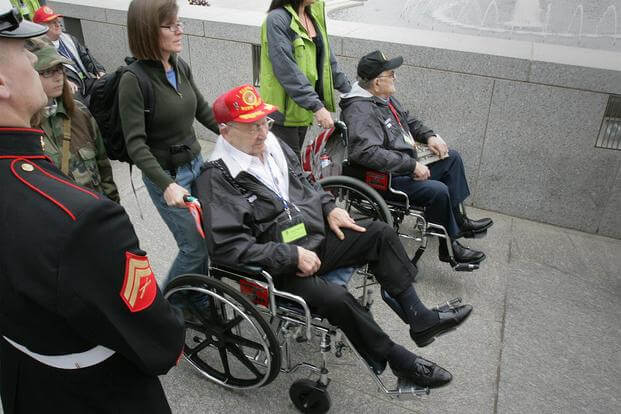Ahead of the Biden administration's rollout of its fiscal 2022 federal budget, veterans advocates are calling for an $11 billion increase in the Department of Veterans Affairs budget to address what they view as shortfalls in health care and benefits services.
Three organizations -- Disabled American Veterans, Paralyzed Veterans of America and Veterans of Foreign Wars -- released their annual VA "independent budget" Monday, an assessment of veterans' needs heading into the fiscal 2022 congressional budget deliberations process.
The report is an "attempt to produce an honest assessment of need" not subject to the "politics of federal budget development and negotiations that inevitably have led to continuous funding deficits," the authors wrote.
Read Next: These Marines Devoted Their Lives to the Corps. Then They were Singled Out for Having Children
"We understand that VA has fared better than most federal agencies in budget proposals and appropriations, but the real measure should be how well the funding matches the demand for veterans' benefits and services," they said.
The report, usually released around the same time as the presidential budget proposal, is used as a tool by members of Congress and staff to assess veterans' needs and perceived issues with VA benefits, including health care.
This year, with the president's budget delayed as President Joe Biden builds his cabinet and administration, authors hope the document will steer the conversation on policy issues important to veterans.
"It is our goal that in working together, authoring and collaborating on the development of critical issues that we are able to put forth an agenda that is by veterans, for veterans," Heather Ansley, executive director of government relations for Paralyzed Veterans of America, said during a call with reporters.
The proposal calls for more than $3 billion in additional funds for health care services above the VA's nearly $99 billion in advance appropriations for fiscal 2021. Authors said the increase is needed to address an expected surge in post-pandemic medical appointments and procedures, as well as an increase in beneficiaries who may qualify for VA health services as a result of pandemic-related unemployment.
The funding would also help fill vacancies, improve the department's private network health programs, and expand access to long-term care.
The groups propose increasing the department's informational technology infrastructure and the Veterans Benefits Administration to help eliminate the disability claims review backlog, improve virtual work environments and support the continued rollout of the department's new electronic health records system.
They also want an additional $1.5 billion for construction and infrastructure, including projects and seismic updates on existing buildings.
In addition to the budget, the groups released their top priorities for the coming legislative season, a compilation of 11 "critical issues" that "must be addressed to ensure veterans, their families, and survivors have access to the care and benefits they earned," the authors wrote.
At the top of the list is reinstating a safeguard on disability claims known as the 48-hour review -- a period in which veterans service officers could review claims decisions to ensure that they were properly handled.
The VA revoked the privilege in April 2020, and advocates say it has hurt veterans who may not have the correct date on their submission or have been denied benefits because of errors.
The groups also have made service-related environmental exposures a top priority, pressing for benefits for vets who have become ill as a result of contaminants on military installations and battlefields.
The authors say they plan to press for increased research on pollutants and exposures; expanding the list of Agent Orange presumptive conditions to include hypertension and monoclonal gammopathy of undetermined significance, or MGUS; and increasing the list of locations -- particularly for Agent Orange -- where veterans likely were exposed.
Also on the priority list are increased benefits for surviving spouses of disabled veterans. The groups would like to see dependent and indemnity compensation increased; to replace the 10-year period of eligibility with a graduated scale that starts at five years; and to extend disability payments to surviving spouses of veterans who die from amyotrophic lateral sclerosis, regardless of when they were diagnosed with ALS and when it was determined to be service-connected.
Other priorities listed by the veterans organizations include:
- Rebuilding VA infrastructure
- Ensuring that veterans have access to long-term care and support
- Enhancing mental health services and suicide prevention efforts
- Focusing on veterans unemployment issues
In the past two decades, the VA’s budget has more than quintupled: In 2001, the budget was roughly $45 billion. For fiscal 2021, the total was $243 billion.
The authors acknowledged the large increases in the VA budget but said more funds are needed to fully care for the nation's former service members.
"We recognize Congress provided VA a generous budget for fiscal years 2020 and 2021 in light of other federal departments and agencies and federal budget caps. We also recognize VA's budget request has been insufficient for VA clinicians and employees on the front lines to successfully execute new and mounting requirements to improve the lives of our nation's ill and injured veterans, their families and survivors," they wrote.
-- Patricia Kime can be reached at Patricia.Kime@Monster.com. Follow her on Twitter @patriciakime.
Related: VA Secretary Nominee: I Will 'Fight Like Hell' For Veterans













